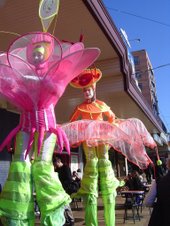"How is education supposed to make me feel smarter? Besides, every time I learn something new, it pushes some old stuff out of my brain. Remember when I took that home winemaking course, and I forgot how to drive?” (HOMER SIMPSON)
In this blog posting I want to blend together two things I love. Namely, (1) shifting thinking about education; and (2) watching television. If you think these two things are incompatible, I hope to change your mind. Let's begin with a true story, which starts with (1) and ends with (2):
True Story: Jen takes on the legal education system
My friend Jen teaches Public Health and Social Research Methods at university. In recent years she's become interested in exploring the spaces where public health, research, law, and ethics intersect - so last year she decided to go back to school complete a postgraduate degree in Law. Being herself an educator, Jen has sometimes felt compelled to challenge and critique the methods and style of teaching she experiences at Law School and was even moved to write an essay on the topic (which she kindly shared with me) entitled "It could have been different: Emphasising Student Empowerment (Voice, Agency, Needs) in Modern Legal Education". In this essay, she examines and critiques some of the messages that legal education is transmitting through some of its most traditional and entrenched teaching practices. These include: the use of strongly hierarchical learning environments, aggressive or intimidating pedagogies, and a culture which teaches students that legal opinions ought to be written to sound as if they were produced by some invisible, disembodied entity of pure rationality and detached from embodied experience. I won't go into detail here, but Jen believes (and argues rather convincingly in my opinion) that legal education needs to do some serious shifting-thinking about education in order to address and accomodate the many challenges, criticisms, that have been levelled at it by various students, scholars, theorists, and educators. (If you want to know more about this, ask Jen!)
You might be wondering how a law course would even allow a student to submit such an essay. Well, stay with me, because now we're heading towards the good bit - the television part:) The class for which this essay was allowed was jurisprudence, the study of the theory and philosophy of law. In addition to allowing students like Jen to write essays critiquing the very practice of legal education, the teacher of this class encourages students to watch and dissect representations of law and the legal profession in the popular media. We're talking about TV shows like Boston Legal, or Law and Order, films like Legally Blonde,The Firm, books like Bleak House and The Crucible, and even excerpts from bodice-ripping Mills & Boon novels! In the teacher's view, the exploration of these fictional texts is a potent way for students to develop a "big picture" view of the workings and ethics of law - for example, in the way that the narratives raise legal issues, problems with the legal system, bringing in context, consequence, and clients' perspectives. This "woods for the trees" approach sits in contrast with the tendency of law teaching in other courses to focus on minutiae and the micro-analysis of facts and wordings.
Suffice to say that Jen's story has been extraordinarily stimulating to my television-loving mind. It's got me wondering how I might be able to draw on some examples from popular media to frame up some ideas relating to "shifting thinking" about teaching and learning in the 21st century. So I've set myself a little assignment - one that I'm really looking forward to. I'm going to pick three fictional stories from books, television, or film, and deconstruct these to examine some ideas about schooling and education:
- how do they represent how schooling/education is?
- what do they say about how we think schooling/education "should be"?
- and (if I can find some good examples) what kinds of possible futures can fictional stories imagine for schooling, learning, and education?
You're welcome to join me in this assignment. It's easy, just switch on the TV (or open a book), and of course, switch on your mind. Let's get together again soon and compare notes, shall we?
* I borrowed this title from the film "Dr. Strangelove", but it's slightly misleading. I haven't stopped worrying, and I've always loved TV.


No comments:
Post a Comment